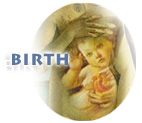|


Confronting
the risks of pregnancy, Jewish women have resorted to magical customs,
in addition to conventional prayers and donations to charity. Since
the earliest days of Jewish history, women have used amulets, magic
stones, incantations, and protective bindings in the hope of safeguarding
their pregnancy.
Jewish amulets
for protecting pregnancy from misfortune bear a supplication, or more
generally, God's name or permutations of its letters, with relevant
biblical verses or an acrostic of the verses. Extant examples from post-talmudic
Palestine have revealed invocations to helpful angels to protect pregnancy,
as well as efforts to bind or expel some harmful spirits. One such amulet
bears Psalm 116:6 ("The Lord protects the simple; I was brought
low, and He saved me") to protect against premature delivery. Another
amulet invokes the help of the rod of Moses, the ring of Solomon, and
possibly the shield of David in expelling an evil spirit. An amulet
preserved in the Cairo Geniza, dating from medieval times, invokes names
of God to protect against "any of those seven spirits that enter
into the entrails of women and spoil their offspring" and to ensure
that she should not abort her fetus.[1]
A medieval
Judeo-Arabic text on the magical use of psalms recommended an amulet
inscribed with Psalm 1 to protect against miscarriage, advice repeated
in a widely circulated medieval guide to the protective use of psalms.
The latter also recommended the writing of Psalm 128 (". . .Your
wife shall be as a fruitful vine . . .") on kosher parchment, which
a pregnant woman could carry on herself at all times.[2]
A kabbalistic
manuscript compiled in Damascus in the mid-sixteenth century, Shoshan
Yesod Olam, offered seven formulas for the preparation of amulets
for protection of pregnancy, including magical names for God, angelic
invocations, formulas against evil spirits, magic squares, the seal
of Solomon, and the shield of David (Magen David). A popular
book, Toldot Adam, published in Eastern Europe in the early eighteenth
century, drew from these formulas in the "tried" advice it
gave for protecting against pregnancy loss. Furthermore, it specified
that only a God-fearing mekubbal (a man trained in Kabbalah)
over forty years old should inscribe such amulets. Many Yiddish-speaking
Jews as well as Jews in the Ottoman Empire used this book. Amulets for
protection against pregnancy loss used by Persian Jews before emigrating
to Israel bear similar magical formulas.[3]
Jews
invoked God's name in incantations and over potions for protecting pregnancy,
not only on amulets. For example, a prescription dating from the talmudic
era against miscarriage — even if a woman
bleeds vaginally — entailed whispering the
unspoken name of God before drinking from a cup of wine, every day for
a week. Toldot Adam offered a protective incantation invoking
angels for a pregnant woman to recite whenever she leaves her home.[4]
Kabbalistic
elements were also featured in a remedy book from Yemen, written in
Hebrew in the nineteenth century, but certainly copied from earlier
sources. For an amulet for a pregnant woman, the book instructed the
scribe to write the names of the angels Michael, Gabriel, Shamriel,
and Raphael, who guard the baby in the womb, followed by these adjurations:
"By the power of the angels, by their strength, their holiness,
and their purity, may they guard, protect, help and cause to fructify
the fetus in its mother's womb [the woman's name is inserted here] .
. . that it should not be moved by anything bad, not by demons or harmful
elements and not by an evil spirit. I adjure you, Lilith and your escorts,
I adjure you, by the power of . . ." the tetragrammaton and a series
of other names for God,". . . check on the fetus in its mother's
womb [the woman's name is again inserted here] that it should not be
moved by anything bad . . ." After some further exhortations, the
text finished with some angel script (magical signs) and a magic square.[5]
A Yemenite Jewish woman rolled up the parchment bearing this inscription
and wore it in an amulet case on her necklace until her pregnancy reached
full term.
An
Ashkenazi Hebrew manuscript recommended use of an amulet in a different
way for protection against a future miscarriage: the names of three
angels — Starbiel, Gastrakhiel, and Sandalphon
— were written in Hebrew on kosher parchment
and put in a grave together with the last aborted fetus.[6]
 |
1.
Naveh
J. and S. Shaked, Magic Spells and Formulae (Jerusalem: Magnes
Press, 1993). pp. 93, 102, 155. [back]
2. Isaacs,
H. Medical and Paramedical Manuscripts in the Cambridge Geniza
Collections (Cambridge: Cambridge University Press, 1994) Shimmush
Tehillim (Cracow: 1648), see Psalms 1 and 128; for an English translation,
Jewish Encyclopedia (London: 903), "Bibliomancy." [back]
3. Tirshom,
Joseph, Shoshan Yesod Olam, Sasson ms. 290. Luntz, Elihau ben Moshe¸
Toldot Adam (Zolkiew: 1720) sections 44 and 75 provide formulas
for making amulets for protection of pregnancy. Rozenberg, Y.Y.,
Rafael ha-malakh (Piotrkow: 1911). Davis E. and Frenekl,
D.A., Ha-kame'a ha-ivri (Jerusalem: Institute for Jewish
Studies, 1995) amulets 296, 340-42. [back]
4. Gaster,
M. Studies and Texts: The Sword of Moses, (New York: Ktav,
1971), p. 332. Another incantation for the same purpose was recorded
in Luntz, E. 1720, op cit. no.149. [back]
5. Gross
YM, 11.39, Collection Bill Gross, Tel Aviv, translated by the author.
[back]
6. Grunwald,
M. "Charms and Magic Recipes," Edot 1 (1945): pp.
241ff. [back] |
 |
 From:
Michele Klein, A Time to be Born: Customs and Folklore of Jewish
Birth. � copyright 1998 by Michele Klein (Philadelphia: Jewish
Publication Society of America), pp. 90-91. Permission of the author
and Jewish Publication Society of America. From:
Michele Klein, A Time to be Born: Customs and Folklore of Jewish
Birth. � copyright 1998 by Michele Klein (Philadelphia: Jewish
Publication Society of America), pp. 90-91. Permission of the author
and Jewish Publication Society of America. |
|



